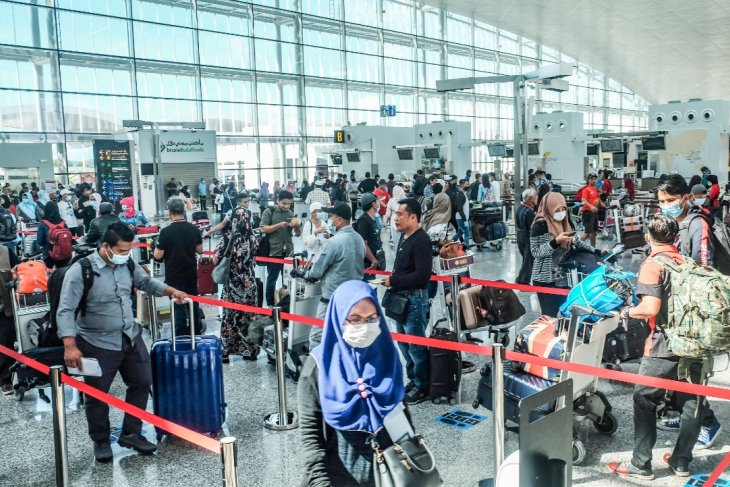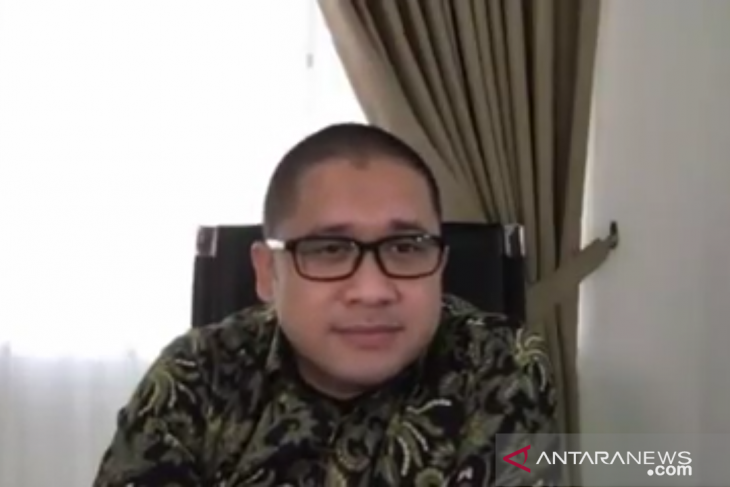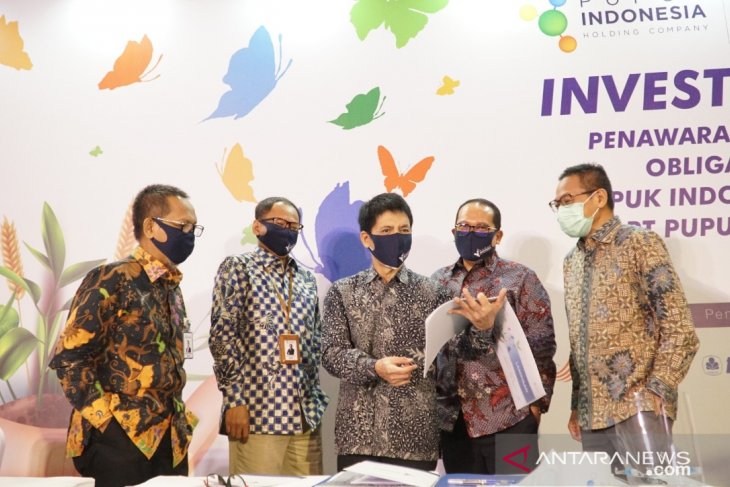Live Streaming
Program Highlight
Company Profile
Indonesian Embassy in Tripoli Continues to Improve Indonesia-Libya Relations through Socio-Cultural and Economic Activities
Written by Ani HasanahJakarta (VOI News) - In the midst of handling COVID-19 and the current Libyan security situation, the Indonesian Embassy in Tripoli continues to carry out activities in the social, cultural, and economic fields. This activity is expected to provide reinforcement for relations between the two countries. This was conveyed by Amar Ma'ruf, Chargé d'Affaires at the Indonesian Embassy in Tripoli, to Voice of Indonesia in Jakarta, Monday (07/20).
"Libya is currently still facing the efforts of their national reconciliation process and also in the handling of COVID-19, we carry out activities in 2 forms that we hope can provide reinforcement for both nations, namely we try to carry out activities in the socio-cultural and economic fields in a virtual format which is expected with the help of communication media at this time the relationship will be maintained so that it can still provide an opportunity for related parties in related fields to communicate and exchange technical matters," Amar Ma'ruf said.
Amar Ma'ruf further said that another form of activity carried out by the Indonesian Embassy in Tripoli is to hold a limited physical meeting with due regard to health protocols. One of them is by holding activities that are empowering the community by collaborating with local professional institutions and opening trade and other economic communication contacts.
Amar Ma'ruf added that the challenges faced in the relations between Indonesia and Libya today are the geographical location of the two countries which are very far away and the lack of connectivity that connects the two countries. (VOI / ADVENT/ AHM)
July
Nearly 1,000 Indonesians Repatriated from Brunei Darussalam
Written by Ani Hasanah As many as 246 Indonesian citizens and migrant workers returned to Indonesia from Brunei Darussalam on board a special repatriation flight on Sunday (July 19, 2020). (Handout- Indonesian Embassy in Bandar Seri Begawan).
As many as 246 Indonesian citizens and migrant workers returned to Indonesia from Brunei Darussalam on board a special repatriation flight on Sunday (July 19, 2020). (Handout- Indonesian Embassy in Bandar Seri Begawan).
The Indonesian Embassy in Bandar Seri Begawan has so far arranged six special flights to help nearly one thousand Indonesian citizens fly back to the country from Brunei Darussalam.
On Sunday, July 19, 2020, the embassy arranged its sixth special flight to Jakarta to repatriate 246 Indonesian citizens and migrant workers.
As many as 912 Indonesian citizens and migrant workers have returned to the country from Brunei Darussalam on the six special flights, according to a press release issued by the Indonesian Embassy in Bandar Seri Begawan, which was received in Jakarta on Monday.
The first special flight was arranged by the embassy on May 1, 2020, and was bound for Jakarta; the second flight, bound for Jakarta, was arranged on May 15; the third flight, bound for Surabaya, was operated on May 17, 2020; the fourth flight, bound for Jakarta, on June 21, 2020; and, the fifth flight, bound for Jakarta, on July 5, 2020.
The sixth flight carried three seriously ill Indonesian citizens and seven Bruneian diplomats with their families to Indonesia, bringing the total number of passengers on board to 253.
"Taking into account that there are still many Indonesian citizens and migrant workers still submitting requests to return to Indonesia, the Indonesian Embassy is planning a seventh special flight in August, but this time to Surabaya," said Indonesian Ambassador to Brunei Darussalam, Sujatmiko.
Ambassador Sujatmiko further explained that the seventh flight will accommodate Indonesian citizens and migrant workers hailing from East Java and its surrounding areas.
He also expressed the hope that by September this year, the Royal Brunei Airlines will resume normal flight operations to Indonesia, especially to Jakarta, Surabaya, and Bali.
Except for the repatriation of the seriously ill and those released from prison, the return of Indonesian nationals was self-funded. A majority of those who returned from Brunei Darussalam were migrant workers whose employment contracts had expired. The Indonesian Embassy in Bandar Seri Begawan provided all passengers with gloves, masks, and travel permits. In addition, each passenger was asked to fill a yellow card (Health Alert Card) issued by the Ministry of Health of the Republic of Indonesia.
Upon their arrival in Indonesia, returnees are undergoing COVID-19 screening and protocols, including a swab test and a 14-day quarantine. (ANTARA)
July
Government Prepares National Economic Recovery for 2021
Written by Ani Hasanah
A screenshot. The Fiscal Policy Agency (BKF) head Febrio Kacaribu during a webinar to safeguard Indonesia's economy amid the COVID-19 pandemic in Jakarta on Monday. (20/7/2020). ANTARA/Dewa Wiguna
The Indonesian government, through the Fiscal Policy Agency (BKF) of the Ministry of Finance, is preparing the National Economic Recovery (PEN) Program for 2021 since the impact of the COVID-19 pandemic is projected to continue.
"The 2020 national economic recovery program must be continued in 2021," BKF Head Febrio Kacaribu stated during a webinar to safeguard Indonesia's economic survival amid the COVID-19 pandemic held in Jakarta on Monday.
Kacaribu noted that allocation for the 2021 PEN Program encompasses a focus on social protection, MSMEs, as well as sectoral ministries and institutions and local governments.
The BKF head expounded that the cost for social protection is estimated to not fall too far from the budget allotment for the 2020 PEN that reaches Rp203.9 trillion.
Kacaribu explained that the large allocation for social protection was based on his estimation that unemployment and poverty would still be rife in 2021.
"We will also support MSMEs and regional governments, especially the labor-intensive ones," he noted.
With the continuation of the PEN program, allocation to offset the 2021 state budget deficit is estimated to still be above three percent.
In the macroeconomic policy principles for the preparation of the 2021 state budget drafting, the government proposed a budget deficit of up to 4.17 percent of the gross domestic product (GDP).
However, Kacaribu estimates that budget deficit in the 2021 state budget draft is wider than the earlier proposed 4.5-4.7 percent of the GDP after consultation with the House of Representatives and several parties.
As is known, the handling costs, including the 2020 PEN, reached Rp.695.20 trillion, resulting in a 2020 National Budget deficit of 6.34 percent. (ANTARA)
July
Pupuk Indonesia Issues Bonds Worth Rp2.5 Trillion
Written by Ani Hasanah
President director of Pupuk Indonesia, Aas Asikin Idat (center). (ANTARA /HO-Pupuk Indonesia)
PT Pupuk Indonesia (Persero), Indonesia's largest state-owned fertilizer company, on Monday issued bonds worth Rp2.5 trillion as part of the first phase of its Sustainable Public Offering (PUB) in 2020.
Pupuk Indonesia plans to release bonds worth a total of Rp8 trillion under its Sustainable Public Offering (PUB) II.
The bond issuance is part of the company's strategy to diversify external funding sources apart from banks, president director of Pupuk Indonesia, Aas Asikin Idat, said in Jakarta on Monday
"In addition to diversifying funding sources, this is one of our efforts to reduce interest rate volatility by switching from variable rate to fixed rate, so that we can have long-term efficiency," he said at an online press conference.
The bond funds will be used for re-profiling debt (bank loans and bonds), both at the parent company and subsidiaries.
Idat said he is optimistic the bond issuance target can be absorbed by the market given the company's stable performance, which has, in fact, shown an improvement, even amid the COVID-19 pandemic.
In the first phase of PUB II this year, Pupuk Indonesia will release bonds in three tranches: Series A with a 3-year tenor, Series B with a 5-year tenor, and Series C with a 7-year tenor. Interest payments will be made quarterly, calculated using the 30/360 convention.
For Series A bonds with a tenor of 3 years, the coupon is offered at 6.25-7.25 percent; Series B with a 5-year tenor of 7-8.30 percent; and, Series C with a 7-year tenor of 7.5--8.75 percent.
The initial bond offering period is July 16-30, 2020, while the public offering is scheduled for August 14-18, 2020.
Pupuk Indonesia has appointed PT Bahana Sekuritas, PT BCA Sekuritas, PT BNI Sekuritas, PT Danareksa Sekuritas, PT Mandiri Sekuritas as Joint Lead Underwriters (JLU), and PT Bank Mega Tbk as trustees for the bond offering.
Pupuk Indonesia's sustainable bonds have received ‘AAA (idn)’ rating from PT Fitch Ratings Indonesia. The bonds are being issued without special collateral (clean basis).
Pupuk Indonesia is a state-owned enterprise (BUMN) which has 10 subsidiaries with an integrated business scope. The enterprise has five fertilizer producers — PT Pupuk Iskandar Muda, PT Pupuk Sriwidjaja Palembang, PT Pupuk Kujang, PT Petrokimia Gresik, and PT Pupuk Kaltim.
It also has five non-fertilizer subsidiary companies: PT Rekayasa Industri, PT Mega Eltra, PT Pupuk Indonesia Energi, PT Pupuk Indonesia Logistik, and PT Pupuk Indonesia Pangan.
Pupuk Indonesia plays an important role in securing fertilizer supply to support the national food security program. The company has been assigned by the government to distribute fertilizers at a subsidized rate (Public Service Obligation) to all regions in Indonesia. In addition, it also sells its products to domestic commercial markets and in export markets.
In 2019, Pupuk Indonesia distributed and sold 13.76 million tons of subsidized and non-subsidized fertilizers and non-fertilizer products.
Its total income from fertilizers in 2019 stood at Rp71.3 trillion, an increase of 10 percent annually on average. Meanwhile, the BUMN’s profit increased by an average of 10 percent per year from 2017 to 2019.
Last year, Pupuk Indonesia booked a current year profit of Rp3.71 trillion, with its total assets valued at Rp135.55 trillion.
The company has managed to maintain its ranking as the top 10 global fertilizer companies based on total assets, revenue, EBITDA (earnings before interest, taxes, depreciation, and amortization), and net profit. (ANTARA)



